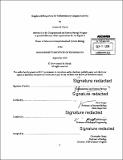| dc.contributor.advisor | Peter Sorger. | en_US |
| dc.contributor.author | Al-Obeidi, Arshed | en_US |
| dc.contributor.other | Massachusetts Institute of Technology. Computational and Systems Biology Program. | en_US |
| dc.date.accessioned | 2015-01-20T17:57:19Z | |
| dc.date.available | 2015-01-20T17:57:19Z | |
| dc.date.copyright | 2014 | en_US |
| dc.date.issued | 2014 | en_US |
| dc.identifier.uri | http://hdl.handle.net/1721.1/93044 | |
| dc.description | Thesis: S.M., Massachusetts Institute of Technology, Computational and Systems Biology Program, 2014. | en_US |
| dc.description | Cataloged from PDF version of thesis. | en_US |
| dc.description | Includes bibliographical references (page 29). | en_US |
| dc.description.abstract | Caspases are a 12-member family of human proteases that regulate apoptosis and inflammation. They serve as key effectors downstream of diverse signaling receptors and shape cell fate. Inflammatory caspases mediate the proteolytic processing of inflammatory cytokines and are essential in maintaining immune function, but also lead to disease when deregulated. In order to examine the activity of inflammatory caspases, we generated 2 inflammatory caspase reporters: a fluorescence resonance energy transfer (FRET) inflammatory caspase activity reporter as well as a fluorescent translocation inflammatory caspase reporter. These reporters were then used to study inflammatory caspase activity in vitro using recombinant caspases and in vivo using a simplified cell culture model. The inflammatory caspase activity reporters have the potential to capture inflammatory caspase activation under a variety of stimuli. They also have several advantages compared to existing methods: they are non-destructive and can be used for live single cell measurements; they do not require the addition of exogenous chemicals or cofactors; and they do not covalently modify the inflammatory caspases. Inflammatory caspase activation is a rapid, asynchronous process, and detecting the activity of the mature inflammatory caspase molecules is made difficult due to the short half-life of the enzyme. The reporters we have developed can fill this need. | en_US |
| dc.description.statementofresponsibility | by Arshed Al-Obeidi. | en_US |
| dc.format.extent | 29 pages | en_US |
| dc.language.iso | eng | en_US |
| dc.publisher | Massachusetts Institute of Technology | en_US |
| dc.rights | M.I.T. theses are protected by copyright. They may be viewed from this source for any purpose, but reproduction or distribution in any format is prohibited without written permission. See provided URL for inquiries about permission. | en_US |
| dc.rights.uri | http://dspace.mit.edu/handle/1721.1/7582 | en_US |
| dc.subject | Computational and Systems Biology Program. | en_US |
| dc.title | Single-cell reporters for inflammatory caspase activity | en_US |
| dc.type | Thesis | en_US |
| dc.description.degree | S.M. | en_US |
| dc.contributor.department | Massachusetts Institute of Technology. Computational and Systems Biology Program | |
| dc.identifier.oclc | 899265821 | en_US |
